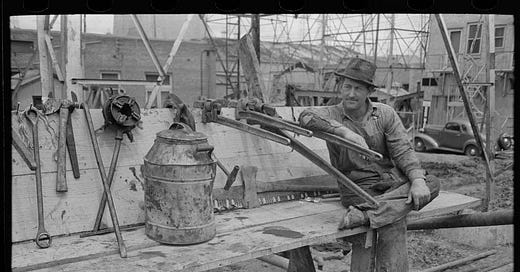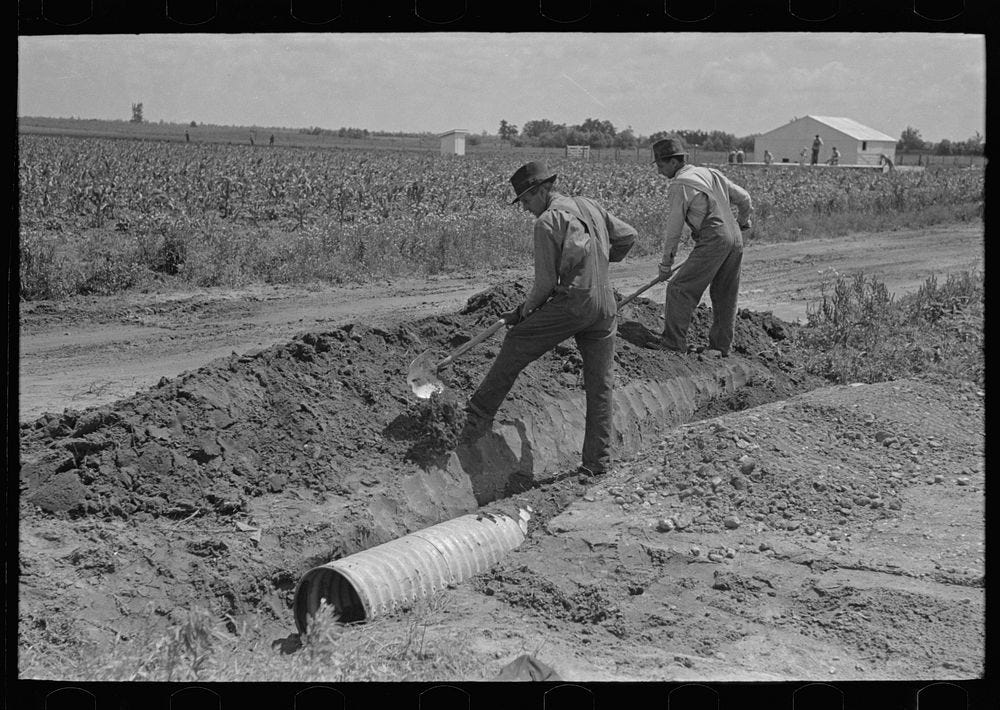The East Texas Oil Field was discovered in 1930. It was the biggest oil field in the world at the time. It was a Boom Time. A number of the legendary Texas fortunes originated from the East Texas Oil Field Discovery—the biggest, of course, being the H. L. Hunt billions. The local landowning population collected buckets of money from oil royalties. Local businessmen extracted more than decent profits by selling over-priced necessities to the workers. Gamblers earned a fair amount fleecing the locals. And it is said that even ordinary thieves, thieves of both oil and money, had a field day.
But for the majority of the Boom Timers, the importance of the East Texas Oil Field was a job. During those miserable times of the Great Depression, a job in the oil industry meant the difference between a poorly paid job and no job at all. A job in the oil field was difference between “food not fit for a dog” and starvation.
Thousands trekked to Kilgore and the surrounding area to find work, even if it was underpaid work.
In a previous post, PHIT talked about the Texas Ranger called Lone Wolf Gonzaullas and his peculiar strategy of arresting people who had smooth hands on the theory that smooth handed people had no business being in Kilgore. In this post, I am going to talk about those rough handed people who worked for a living and worked hard and didn’t get anything from the oil bonanza except $4 a day and enough food to eat to keep going.
Roy Fewell was one of those workers. Please note that the photo above is not Roy Fewell. We interviewed Mr. Fewell in 1983 for the PHIT documentary Boom Times. Later in his life, Roy Fewell became a skilled and gifted carpenter. But in 1931, he was 20, jobless, and it was the middle of the depression. The unemployment rate was hitting 25% in the nation and it was even higher in rural areas.
“We were all out of work. My brother was working for a paving company in Dallas at the time, and he is the only one of us that was working.”
When the East Texas field started exploding with production, Roy’s brother got his old job back “stringing pipe” for the Tibbet and Tibbet construction company,
Roy Fewell was asked he would like to go to work down there.
Roy Fewell responded eagerly, "Yeah."
“So the next morning I lit out for East Texas with my thumb stuck out. I walked from downtown Dallas out to Buckner's Orphan's Home [about 8 miles out of town] before I got a ride.
I wasn’t a very good thumber. Anyway, a fellow picked me up there and carried me to the outskirts of Tyler.
[The driver was working pipe as well and told Fewell about slinging pipe.]
“Oil pipe is steel pipe, 12 -inch steel welded pipe. It used to be screw pipe—put together with threads and the workers screwed the pipe together.
But they had learned better and they were welding the pipe together by that time. Anyway, this pipe came in 12 -inch diameter, 40 -foot long,
somewhere in the neighborhood of 1600 pounds to the stick, as it was called."
Fewell got left off at Arp[southeast of Kilgore] about two o 'clock afternoon.
“I hadn't had any dinner. In fact, I had had only a very little breakfast. I had six cents and two car fares in my pocket. I was nearly threadbare.”
[His brother had arranged for him to live in a boardinghouse.]
“They had the big tables, like in the Army mess halls, and the ladies would come around and set the beans and peas and whatever it was in front of you.
They had a lot vegetables and they cooked them in water and the water in East Texas was bad. If you've ever had any experience with bad water, you know what the water did for us there.”
When asked what work he did, Mr. Fewell was dismissive.
“Really, it was just labor work on the pipeline, stringing pipe. And I don't know if there's anybody who would call it a trade of any kind.
It was just labor, pipeline labor. We were working for four dollars a day. And we had no set hours to work.
We strung one line from Corsicana to Kilgore.
The other line we strung from the Pure Oil Refinery Plant in Port Arthur to Kilgore for the Sun Oil Company.
There was 750 miles of line that they had under contract to spread, to put these lines in and then to string smaller lines to the wells.
One of my jobs was seeking out places to get trucks into the line.
I would run into a lot of different people and find places out where people
just pulled pine branches down and made them a bed and sleep there the night before. They were very primitive because there wasn't anybody with any money.
Even the workers wasn't making money. Four dollars a day wasn't much money. This kind of work had always paid around twenty dollars a day. But being as it was depression times, they were making the best of it. And whatever they could get you to work for, you did.
We moved to Kilgore on the Sabine River. They had a big circus tent there, and that's where we stayed. They had a cook shack and a cook outside. And that's where we got what food we got. He'd fix us a little lunch to carry with us in the daytime, you know. We had a couple of sandwiches out of old stale ham or shoulder meat, hog, all with a lot of seasoning and it, you know, really was stale meat. It wasn't fit for a dog to eat. Today they'd make them throw it out.
Anyway, I was glad to get four dollars a day. I wouldn't make anything in Dallas. So I was glad to get four dollars at the time.
By the way, we had men come down the line, and they were barefooted.
They begged the boss to put them to work for a dollar a day. And I asked, "Charlie, how come you don't hire these men? You can get them for a dollar a day down here." He says, “They got no shoes. They can't work any further than they can walk. “We got to go miles with this line. See, we're trying to lay as much as five miles of line a day."
That's how hard times was in Texas then. These are just poor farm families, and these men, literally, you wouldn't think there would be people down there then that didn't even wear shoes, didn't have any shoes to wear, I guess. That's how hard times were there.
Hard times, indeed!
When asked about some of the dancehalls that are always prominent in the stories about Kilgore and the Boom Times, Mr. Fewell laughed,
“We were tired and wore out. We didn't feel like going downtown to any of the things. And heck, we had no money. It was about five or six weeks before we ever got a payday to start with.
We did have one fellow that was a bootlegger, followed the line, and had a wife and two children with him, and he made home brew. And when we got a payday and got a little money, well, he'd sell the boy’s some home brew."
And then he smiled and said,
“I knew Bonnie Parker. I never knew Clyde Barrow, but I did know Bonnie Parker. She worked in a little cafe downtown. down close to the courthouse Bonnie was a well— just a regular little blonde -headed girl raised out in West Dallas and a hard part of town where poverty was a way of life out there. I know her mother was a was a widow lady and she had Bonnie and a sister and one son. I knew the son through a friend of mine that was a plumber, worked here in town. The plumber dated Bonnie for a while before Clyde ever come into the picture.”
And those are stories pulled from the PHIT archives. Stay tuned as we mine those archives and pull out stories of interest and stories that you won’t find in most history books.





